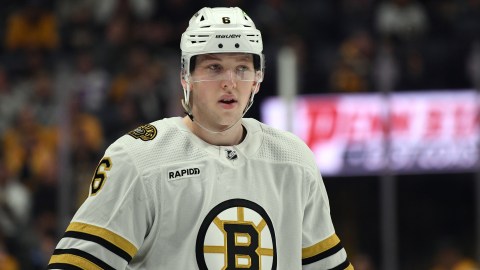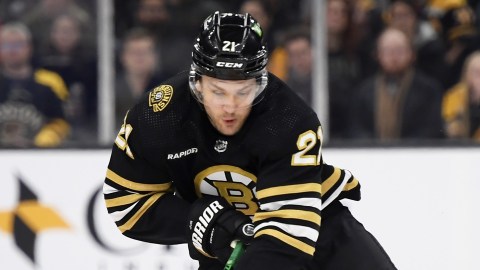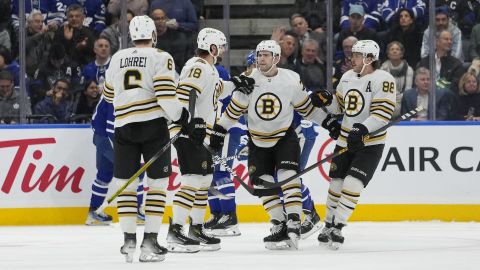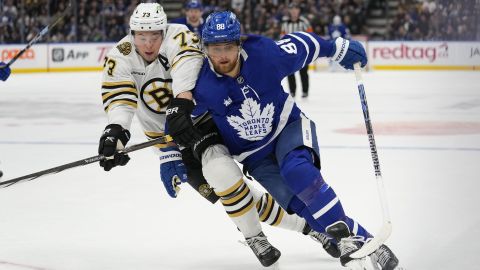The NHL season is only a week old, but it's already apparent that this is going to be a very different campaign than recent years.
Brendan Shanahan is now on the beat as the league's top cop, and he hasn't been shy about exerting his new power. In the preseason alone, Shanahan handed out nine suspensions totaling 28 preseason and 32 regular-season games. He added another controversial two-game ban to Minnesota's Pierre-Marc Bouchard for a high-sticking incident over the weekend.
It's all part of the league's effort to improve player safety (hence Shanahan's new title of executive vice president of player safety) by cracking down on head shots and dangerous hits from behind. But has it gone too far?
After almost universal praise for the transparency of his early decisions, each of which has been accompanied by an explanatory video on NHL.com, Shanahan has begun to come under fire for going too far. NBC analyst Mike Milbury accused him of trying to turn the game into "touch football," Toronto forward Clarke McArthur said he thinks "there's going to be no hitting in this game" after he was suspended for the first two games of the season for a preseason head shot, and agent Allan Walsh called the suspension of his client Bouchard a "shameful farce."
Not surprisingly, like the rest of the hockey world, the Bruins have varying opinions on the crackdown on dangerous hits and the methods Shanahan has employed thus far.
"It's a tough job," Bruins defenseman Andrew Ference said. "It's a hell of a job to try to pick a right number. I'm sure Soupy's dad [Bruins forward Gregory Campbell's father Colin administered NHL discipline prior to Shanahan] knows that better than anybody else. You're never going to make everybody happy, but I think that the fact that it's being called has definitely got the attention of everybody.
"It's a good thing," Ference added. "It's hard when it happens to you or to your teammates, but that's just the way it is. That's the reality of trying to keep guys healthy and trying to deal with some of the issues the game is facing with head shots. If somebody has a better idea of how we should stop it, then they should speak up. But hurting guys in the pocketbook and hurting teams by having guys out, those are big stakes, just like having concussions is big stakes. There has to be punishments and there has to be a hard line taken."
Having seen the devastating effects of concussions caused by cheap shots on their teammates Marc Savard and Patrice Bergeron, no one on the Bruins was disputing the need to punish offenders. The fear is that the crackdown could have other consequences, intended or not, that will radically change the game and take away the physical aspect vital to the sport's appeal.
"It will definitely affect the game," Ference said. "There's always those hidden effects of rule changes where all of the sudden the game changes in ways that you didn't expect. Just like taking interference out and that holding up probably caused a lot of those bigger hits. The game's faster, guys are moving faster. It's one of those consequences that with more suspensions and more policing, you're definitely going to see a lot less open-ice hitting. And you also might see a lot more guys skating around with their head down and getting away with some of those things."
Milan Lucic, one of the Bruins' biggest hitters, shares those fears. He has already seen some examples of officials going too far in the crackdown, but also noted some big hits have not drawn calls.
"I was watching the Montreal-Winnipeg game [on Sunday] and [Jets defenseman Dustin] Byfuglien and [Canadiens forward Brian] Gionta collided and Gionta fell and they gave [Byfuglien] a penalty for no reason at all," Lucic said. "But then [Toronto defenseman Dion] Phaneuf steps up, and even [Jets defenseman Mark] Stuart in that same game steps up and they make good, clean, hard hits, so guys are still stepping up and making those clean, hard hits. But I definitely think there's a lot more guys being cautious."
Lucic hopes that it won't reach the extremes that some critics fear and has faith that Shanahan, who had 2,489 penalty minutes in his 21-season NHL career, won't go too far in reducing the game's physical play.
"They're trying their best to make sure the physicalness and the contact stays in the sport as much as possible," Lucic said. "You look at Shanny and the way he played. He was a real gritty, hard player. What made him such a great player was that he was able to go out there and play as physical as he did. I guarantee he's doing whatever he can to make sure that aspect of the game is still there because I'm sure he appreciates it as much as the fans do."
Bruins defenseman Dennis Seidenberg appreciates what Shanahan has done so far. He hasn't seen a major difference in how the game is being played and supports the suspensions that have been handed out.
"Guys still try to get the guy pretty good, and I think that's the way it's supposed to be," Seidenberg said. "You have to watch out for yourself on the ice and try to prevent going into vulnerable areas. And if you are in a bad area, you have to hope the guy respects you enough not to kill you.
"At the end it's up to Shanahan to hand out the suspensions, but I think they've been right," Seidenberg added. "I haven't seen them all, but I've seen a couple and they've been right."
Not everyone has found all of Shanahan's decisions as agreeable, but there's no denying the hard line he's taken has had an effect on the players.
"There's a lot less recklessness because there is a lot to lose," Lucic said. "You don't want to be suspended. You don't want to miss any time. You don't want to be sitting in the stands for a hit to the head or anything like that. And you look at [Columbus defenseman James] Wisniewski out for eight games. That's 500 grand. That's a lot of money, too. But the biggest thing is nobody wants to be suspended. You feel like you're letting your team down by getting suspended and being able to be out there with them. I think that's why guys are being a little more cautious."
Ference just hopes that players are as cautious about their own safety, and don't use the new crackdown on hits to the head and boarding as a way to gain a competitive advantage.
"I hope it doesn't get to the point where guys change their game with the way they're being hit," Ference said. "It's a really bad thing if guys start skating around with their head down or protect the puck by turning their back and putting their face against the glass. You know it's going to happen. You know guys are going to protect the pack with their back to you and almost tempt you to hit them from behind. It's going to happen, and there's going to be some bad calls. That's one of the consequences."



